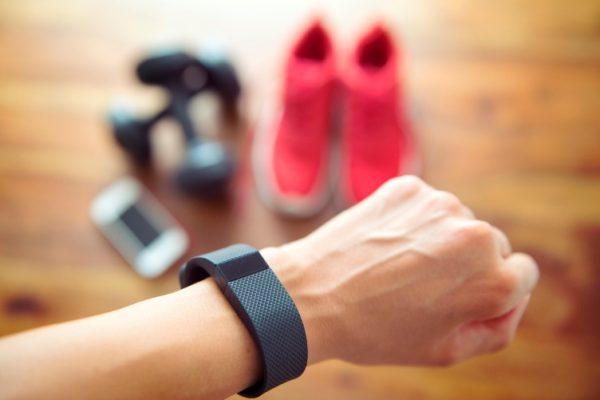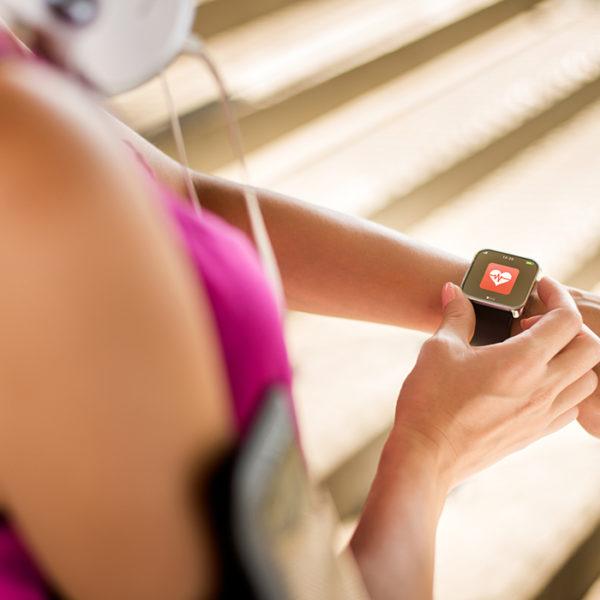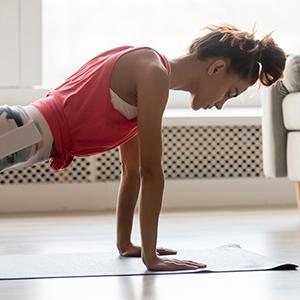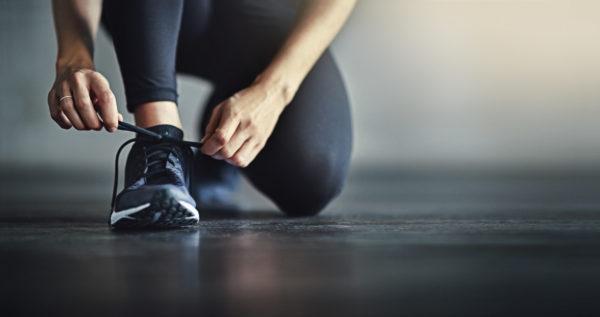It is not uncommon to spot a simple band around a wrist these days. In the last few years, many Americans bought into the fitness tracking trend, utilizing wearable technology to help them monitor different aspects of their health and activity. However, it’s important to note that it’s not one size fits all. What might be a perfect fit for one person won’t tell another the information they need. To help you find your fit, we’ve provided information and insight on heart rate monitors and activity trackers, two of the most popular tools keeping people on top of their health and activity.
Heart Rate Monitors
Heart rate monitors are used to determine the exercise intensity of a training session or any type of race. They are easy to use, relatively cheap, and can be used in most training scenarios. Heart rate monitors come in chest strap and wrist wearable versions.
It is extremely useful to increase your exercise level in a graded and careful manner in order to avoid injuries, overexertion, and excessive stress on the trainable human system. Using a heart rate monitor is a supreme method of assessing one’s general base of fitness, and determining the level of intensity of the exercise session. For individuals with cardiac conditions, or who are at a poor conditioning level, a physician or our staff may recommend that you do not exercise at a heart rate above a certain level. This technology is useful for these individuals because their heart rate can be monitored continuously.
- Main purpose: Heart rate monitors track your real-time heart rate. You’ll see the zone you are in and be able to adjust your intensity one way or the other depending on your goal.
- When to wear: In general, you’ll only want to wear your heart rate monitor during a workout, when you can get real-time data about your heart rate during exercise.
- Other capabilities: A heart rate monitor is more specific than most activity trackers. Most will be able to sync up to your smartphone and provide a few additional pieces of information – such as calories burned, duration of exercise, and further assessment of your heart rate and effort.
- Great for: Heart rate monitors are ideal for high-intensity based workouts so you can ensure that you are exerting the effort required to reach the desired goal. They are also beneficial when you need to vary your heart rate for an exercise so you don’t over-exert yourself.
- Additional Benefit: Oftentimes, physicians recommend that patients with some heart conditions wear a heart rate monitor if they exercise to ensure they stay in safe heart rate zones. If you are anxious about working out with a heart condition, talk to your doctor about how a heart rate monitor could benefit you.
- Accuracy: The chest strap variety of heart rate monitors tend to be the most reliable, followed by a wrist-worn version. Some activity trackers also boost heart rate monitoring as a benefit; these are typically the least reliable.
Right for you?
Heart rate monitors are generally more beneficial for athletes or those who train more intensely. A more casual exerciser would not likely see the benefit out of the level of in-the-moment detail they provide. They can also be a good fit for those who must monitor heart rate for a health condition.

Activity Trackers
There is a wide range of activity trackers, sometimes referred to as fitness trackers, on the market. Their capabilities range from a simple pedometer that counts your steps, to those that sync with a smartphone app and can track and provide feedback on sleep, heart rate, your personal goals, distance, and more. Activity trackers are most commonly found as wrist wearables; some are clip-on versions or even hidden in a piece of jewelry.
- Main purpose: The main attribute of an activity tracker is to count your steps. They include accelerometers to track each step you take. Many can also provide “warning buzzes” if you haven’t hit your step goal by a certain time, as well as provide other minimal on-device feedback. Most will connect with an app on your smartphone where you can track your progress.
- When to wear: It is important to wear or carry your activity tracker at all times (sans the shower, unless yours is waterproof) to ensure it is capturing all of your activity. Many people are most surprised by the number of steps they get in doing regular tasks, and how many they might miss if they don’t make an effort to get up and move.
- Other capabilities: With the popularity of activity trackers, many companies have added additional benefits to attract wearers. Some can track your sleep patterns, and even wake you with a buzz at the right time. Most will show you calories burned and distance walked, and some can also track your heart rate. Many of the apps can also be used to enter and track nutrition and other health information so you have everything in one spot.
- Accuracy: In general, you can expect to see an accurate step count on your activity tracker. Granted, there is some variation among products, and some non-stepping activity can at times get counted, but in general, they are a good barometer of your movement. Some of the additional tracking—heart rate, calories burned, etc.—are likely not as accurate.
Right for you?
Activity trackers can be beneficial for most people, as they gauge our simplest activities right along with more stringent exercise. They are especially great for those starting out with a workout program to keep them motivated to move. Someone who is more intensely invested in their workout regimen—say a marathon runner—may find that the lack of detail about their core activity (think speed, splits, distance and pace) on these devices may keep them shopping for something more specific to their sport, such as a running watch.
In the end, both heart rate monitors and activity trackers offer benefits to those looking to understand their health & activity. With either device, you’ll find helpful information to keep you on track with your goals.
If you don’t feel that heart rate monitors or activity trackers are a fit for you, keep shopping. The market for wearable technology is vast and there are options for every runner, walker, lifter, and biker that can give you the information you seek and help keep you on track with your goals. Happy tracking!







